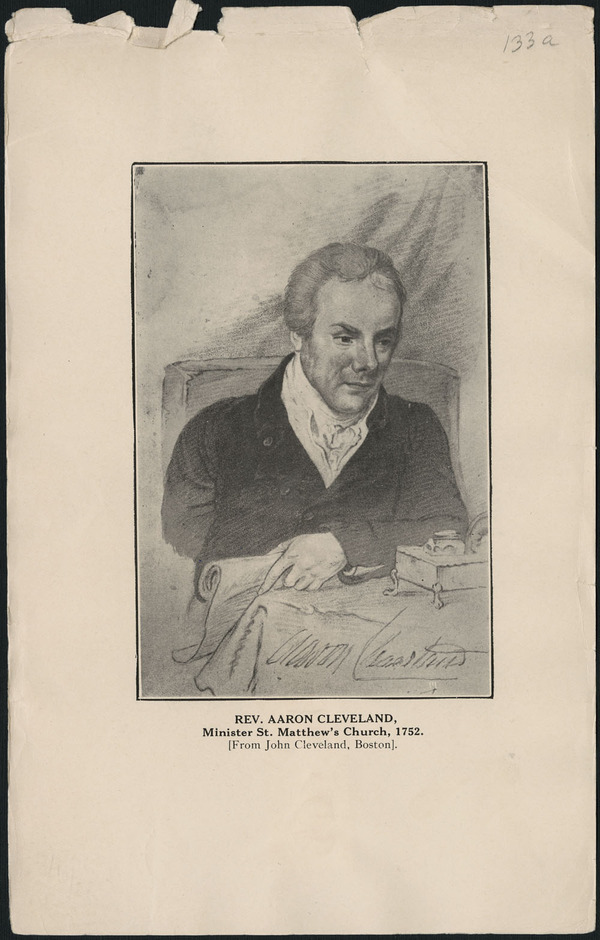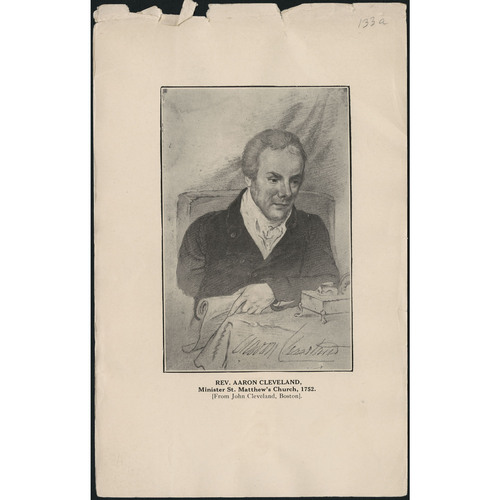CLEVELAND (Cleaveland), AARON, Congregationalist minister and priest of the Church of England; b. 29 Oct. 1715, in Cambridge, Massachusetts, son of Aaron Cleveland, a building contractor, and Abigail Waters; d. 11 Aug. 1757 at Philadelphia, Pennsylvania.
Aaron Cleveland graduated in 1735 from Harvard College, where he was known as an outstanding wrestler, swimmer, and skater, “a large and powerful man.” In 1739 he was ordained in the Congregational church at Haddam, Connecticut, and on 4 August of the same year he married Susannah Porter, an acknowledged belle and the daughter of the Reverend Aaron Porter of Medford, Massachusetts.
Cleveland’s popularity waned within a few years, possibly because he was reflecting the influence of the celebrated revivalist, George Whitefield. In 1746 he “obtained dismission” from Haddam, and in April 1747 was called to Malden South (Everett, Mass.). He paid a visit to Halifax, Nova Scotia, in May 1749, and after preaching to a considerable assembly was urged to “make his settled abode” there. The Anglican community was already served by St Paul’s church and a handsome meeting house was planned for the dissenters (Presbyterians, Congregationalists, Calvinists, etc.). February 1751 found Cleveland in his new charge. Pending completion of the meeting house, he preached in St Paul’s every Sunday in the afternoon “to good Acceptance”; his colleague, William Tutty of the Church of England, discoursed to his flock in the morning. This arrangement worked amicably, and Tutty could inform the Society for the Propagation of the Gospel of the perfect harmony existing between the two congregations. It had been otherwise the previous September, when Tutty had stigmatized the New Englanders as “a cheating designing people,” dishonest and given to prevarication, “and all under the cloak of religion.” Governor Edward Cornwallis*, who found Cleveland “well pleasing,” granted him four lots of land in Halifax and area and took a keen interest in the new meeting house (later St Matthew’s church), of which Cleveland was the first minister.
In a year or so Cleveland seems to have become restless; perhaps once more his popularity was lessening. He was veering towards the Church of England and left Halifax in late 1753 for Norwich, Connecticut, his widowed mother’s home. As acceptance by the SPG demanded his presence in London, he settled his affairs in Halifax before sailing for England in June 1754; he left his wife and children in Boston. He was subsequently ordained and on 28 July 1755 was appointed a missionary of the SPG. The society offered him a post in Pennsylvania. The vessel in which he was returning to America was cast on the Nantucket shoals and Cleveland, who showed great bravery in assisting the sailors, received a severe head injury. Resuming this hazardous voyage he landed in Halifax in October 1755 and shortly afterwards continued to Norwich, still a sick man. The congregation in Lewes, Delaware, would not accept him as their new minister, but on the high recommendation of the Reverend William Smith he was transferred in 1757 to New Castle, Delaware. He then set out for New England to get his wife and ten children. In Philadelphia he stopped to rest in Benjamin Franklin’s house and died there suddenly from “dropsey” on 11 Aug. 1757.
Cleveland’s widow received the remainder of his salary, plus £50, from the SPG and opened a shop in Salem, Massachusetts. Grover Cleveland, twice president of the United States, was a descendant of Aaron.
Essex Institute (Salem, Mass.), ms letter of Aaron Cleveland, [1751]. The genealogy of the Cleveland and Cleaveland families, comp. E. J. and H. G. Cleveland (3v., Hartford, Conn., 1899), I. New Eng. Hist. and Geneal. Register, XLII (1888), 73–78. Shipton, Sibley’s Harvard graduates, IX, 493–500. [R. M. Hattie], Looking backward over two centuries (Halifax, 1949), 10–11. I. F. MacKinnon, Settlements and churches in Nova Scotia, 1749–1776 (Halifax, [1930]). W. C. Murray “History of St. Matthew’s Church, Halifax, N.S.,” N.S. Hist. Soc. Coll., XVI (1912), 150–57.
Cite This Article
Maud M. Hutcheson, “CLEVELAND (Cleaveland), AARON,” in Dictionary of Canadian Biography, vol. 3, University of Toronto/Université Laval, 2003–, accessed December 21, 2025, https://www.biographi.ca/en/bio/cleveland_aaron_3E.html.
The citation above shows the format for footnotes and endnotes according to the Chicago manual of style (16th edition). Information to be used in other citation formats:
| Permalink: | https://www.biographi.ca/en/bio/cleveland_aaron_3E.html |
| Author of Article: | Maud M. Hutcheson |
| Title of Article: | CLEVELAND (Cleaveland), AARON |
| Publication Name: | Dictionary of Canadian Biography, vol. 3 |
| Publisher: | University of Toronto/Université Laval |
| Year of publication: | 1974 |
| Year of revision: | 1974 |
| Access Date: | December 21, 2025 |




